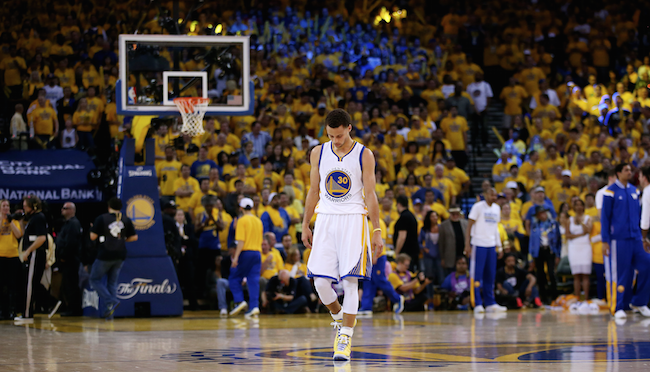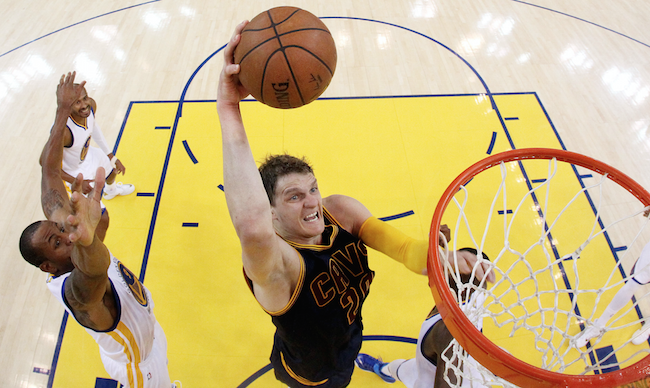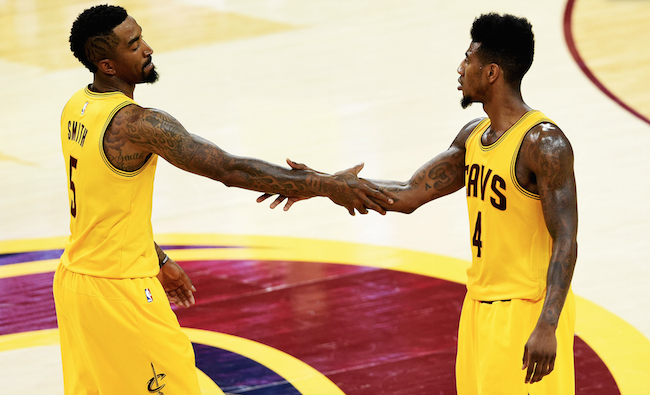
Andre Iguodala lurched for a loose ball as it bounced towards the baseline with his team leading by one in the waning moments of overtime. He grabbed it in time for a midair fling in the direction of Stephen Curry, but the 6’3 guard couldn’t quite handle his teammate’s errant pass. It went through the MVP’s legs and out of bounds, setting the stage for Matthew Dellavedova’s heroic offensive rebound and ensuing free throws.
The Cleveland Cavaliers won Game 2 95-93.
Three nights earlier, Iguodala forced LeBron James into a difficult off-balance 20-footer with the score tied and fourth quarter clock winding down. The miss caromed off the rim and found Iman Shumpert in the far corner, who jumped and hurled a last-gasp jumper at the basket as time expired. But it was just off the mark, sending his team to an overtime period dominated by its opponent.
The Golden State Warriors won Game 1 108-100.
If football is the game of inches, basketball is one of centimeters. And if this sport is one of centimeters, what exactly does that make these NBA Finals? The Warriors and Cavaliers played to a virtual standstill through two wildly intense games at Oracle Arena. Both teams share a confidence they let a 2-0 lead slip away, but they also hold the same fear of coming so close to an 0-2 deficit.
Though crunch-time possessions always stand out, games are never won or lost on a single sequence. Iguodala’s save and Shumpert’s heave indeed would have given their respective teams victories in contests they’d ultimately lose, but neither player would have been forced to complete those difficult plays if Golden State and Cleveland had won any other previous trip down the floor. The margin between winning and losing is that razor thin.
This is the Finals; every possession matters. And with an already epic series tied 1-1, these three factors could go a long way to deciding Tuesday’s crucial Game 3 from Quicken Loans Arena.
The Change In Venue

The Warriors are 8-2 at home during the playoffs after going a mind-boggling 39-2 from the friendly confines of Oakland in the regular season. For months of talk about Oracle Arena being the best atmosphere in the NBA, the first two games of the Finals cemented its reputation for so many dubious NBA followers across the country. No fans are louder or more influential than Golden State’s.
But that reality might be having a negative effect on Steve Kerr’s team with the stakes so high. The Warriors’ offensive rating at home in the postseason is 103.5, a mediocre number nearly seven points lower than their mark on the road. Why? There’s a growing belief in the Bay Area that Golden State gets a bit too amped up playing in front of the raucous Oracle crowd.
That's definitely part of the @ThompsonScribe theory… https://t.co/Iyn5XghDmW
— Tim Kawakami (@timkawakami) June 9, 2015
The numbers support that notion, too. The Warriors have turned the ball over on 16.6 percent of possession during postseason home games compared to just 14.4 percent in road tilts. Could that be a random statistical anomaly? Absolutely. But Golden State simply hasn’t been itself offensively against Cleveland so far, and every potential justification for those struggles deserves exploring – and yes, while acknowledging the Cavaliers’ stellar defensive effort and James’ unceasing commitment to slowing the pace.
Don’t be surprised if the Warriors are in sync at The Q come Game 3, though. They’ve been more comfortable on offense away from Oracle Arena all playoffs long.
The Super-Small Chess Match

James was the star of the first half in Game 2, but Timofey Mozgov’s impact loomed nearly as large. The surprisingly nimble Russian scored 11 points and grabbed six rebounds in the initial 24 minutes of Sunday’s contest, proving a major pain on the offensive glass and canny cutting beneficiary of James post-ups. And even though his stellar play continued early in the second half, Mozgov went to the bench with 1:50 left on the third quarter clock and never returned to the floor.
After the game, David Blatt was asked about his decision to leave the 7’1 behemoth on the sidelines for the entirety for the fourth quarter and overtime. “We played the lineup we thought we needed to play to match up properly with them,” he explained, “and at the same time not lose an advantage at the other end.”
That rationale makes sense. Kerr employed his vaunted super-small lineup with 8:44 left in regulation as his team trailed 69-64 and stuck with it for the game’s duration. That unit – Curry, Klay Thompson, Iguodala, Harrison Barnes, and Draymond Green – feasted during the regular season and has continued doing so during the playoffs. It’s no accident that Golden State’s dominant overtime performance in Game 1 came with that group on the floor for the period’s majority.
The Warriors’ super-small lineup presents a dilemma for Cleveland. Though Mozgov is a more effective scorer than Tristan Thompson, the latter’s ability to stay with smalls on switches and hedge hard and recover on ball-screens involving Curry makes him a more viable defensive option than the former. But Mozgov, “guarding” Iguodala by essentially treating him as a non-entity, fared well on that end in the first half versus Kerr’s favorite unit and proved too big for Green to deal with in the paint – he had six easy points in a late second quarter stretch.
Playing both Thompson and Mozgov for extended minutes against any Warriors lineup is a losing proposition for the Cavaliers, and simply not an option at all when Green shifts to playing nominal center. Will Blatt try his hulking seven-footer when Kerr inevitably goes super-small in Game 3? Cleveland’s offense would likely be juiced by that adjustment; the question is if Mozgov can hold his own on the other end.
But matchups provided by that Golden State quintet can be beneficial for the Cavaliers in areas other than the offensive glass, too. James Jones gave his team a huge boost off the bench in Game 2, scoring eight points while spacing the floor for LeBron post-ups and pick-and-rolls and mostly holding his own on defense. The 34-year-old string bean can’t capably bang with a traditional Warriors frontcourt, however, and can be “hidden” on Iguodala, Shaun Livingston, or even Barnes when Kerr goes super-small – a win for the Cavs.
Basketball is always a chess match, but never more so than under the NBA Finals microscope. The passive or active reactions of each coach to the other’s adjustments will loom large in Game 3.
The Shot-Making (In)Ability Of Smith And Shumpert
J.R. Smith scored 13 points on Sunday night and Shumpert broke the overtime tie with a huge three-pointer. But the former New York Knicks have almost vanished entirely in the Finals on offense after emerging as consistent ancillary options against the Chicago Bulls and Atlanta Hawks.
The pair combined for just 35 points on horrid 12-of-43 shooting (27.9 percent) in Oakland, making a more acceptable but still poor 8-of-24 (33.3 percent) from beyond the arc. Shumpert’s impact on the other can’t go unnoticed, of course; he did an admirable job guarding Curry in Game 1 and also made several big defensive plays in Game 2. But the same can’t be said for Smith. If he’s getting well over 30 minutes of court-time, the former Sixth Man of the Year needs to be knocking down shots at a semi-respectable clip. Otherwise, Smith’s undisciplined defensive nature is just too debilitating to justify so much playing time.
There’s only so much Smith and Shumpert can do as an even bigger onus falls on the shoulders of James with Kyrie Irving sidelined. In fact, it might be a good idea for Blatt to put both players in more ball-screen situations just so they can feel involved offensively. The effects of comfort and confidence are real, and those attributes can be fleeting when players are little more than glorified spot-up shooting options. But that’s simply the role Smith and Shumpert occupy for this Cavaliers squad.
Basketball is a make-or-miss game; just ask Curry about that after his career-worst shooting performance two nights ago. Will the shots finally start falling for Smith and Shumpert in Game 3? With the Warriors poised for a better offensive showing, Cleveland needs all the extra offensive punch it can get.
*Statistical support for this post provided by nba.com/stats.







